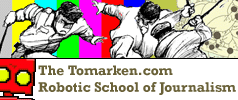 |
Unified Chaos Mark G. Nugent-Invtervalist 03.28.05-Bozeman, MT |
I guess this one is finished -mark
One usually begins in the study of knowledge with the posing of the argument from illusion. This argument from illusion leads to the question of the difference between sense data and physical objects.
If one questions whether we can know either of these then one might be considered radically skeptical. I think the most convincing skeptical account is a less drastic, more limited one. Consider the turning coin. If the coin is seen as nothing more than a collection of patterns then the coin can be both circular and elliptical at once.
As per our limitation in perception, physical objects should not be understood to exist separate from the realm of the mind that is to say that objects themselves are more limited as well. This is not to say that either the most commonly agreed upon views of consciousness or external objects are correct and that one area should supersede the other. This view asserts that we can avoid the problem of the gap between sense data and physical objects by asserting that neither area provides a solid ground for perfect knowledge. As a corollary this view is at odds with the current scientific view of physical objects and also with common sense na√Įve realism. The first part of this alternative view expressed in this paper is not very controversial. All life forms are simply pattern perceiving creatures. I think that the next step would be more controversial.
The sense data is only a collection of patterns. The idea of a moment and a point in space are useful for organization and communication, but they do not actually exist either in the mind or in the external world. The ideal that Descartes meditated on was a perfect one that one could turn a reality around. What better to exemplify this than the geometric point? It is this sort of background assumption, of the point, that leads to the primacy of mathematical truth and then the centrality of the order of science and finally the problem of elusive exactness in the scientific practice. In response Hume formulated that the basic unit of reality is the moment. This perspective forwards the notion that no moment is greater or more basic than any other moment. This perspective encourages the incorrigibility of experience as produced from the senses. However the issue that is left unresolved is the problem of illusion as belief seemingly contradicts our senses in these cases. Thus the self is divided, and the underlying paradox remains unresolved. The idea I assume as basic is that nothing exits separate from anything else. In this way this alternative, as a modified Humean approach, seems to be a product of the coherentist persuasion.
However it is slightly more extreme as this view goes on to assume that unquestionable clarity of knowledge, any pure state of existence whereby one could base clear knowledge, and furthermore any finalized discreet identity formulation are absolute fictions. Hume claimed similarly that objects were such fictions. These concepts are constructed from the force of human wills as driven by the need for order rather than from experience, and as well these constructions are not necessary for our scientific models to be consistent. Since nothing is discreet we are all a part of what we perceive. In fact it only makes sense that we must be a part of what we perceive in order to perceive anything. So why must we go on to say that nothing is discreet given that everything is interconnected. Consider Zeno’s paradox about the distance to the wall being halved as we approach. The answer is that we are a part of the wall before we begin our walk toward it to touch it. The senses allow what is outside of us to reshape what we are and in so doing the external and the internal are mixed and therefore we can become conscious of the “external”. Here I deny the gap as a phenomenalist would. But I do not fret about the problem of solipsism because I think the stuff of the mind is the stuff of the universe.
That is they are both patterns alone, “externally” and “internally”.
Some particular commonly reoccurring patterns are considered to exist by many a layperson globally. Some of the more persistent patterns are taken to exist for a large number of experts or those privy to a particular cultural understanding. All of this is merely correlation rather than cause and effect. Therefore if no entity exists apart from any other than we can really only know the patterns inside the flux. Since there is no thing to know it might be said that we know nothing. As if there is not plurality then we can only know one thing and thus thing-ness is immaterial. I think that the most important response to this position is that thing-ness is all around us and most nearly universal. Since we must all act as if objects exist with extension and over time which comes and goes, ergo moment by moment. My response to this is that all life is also organization making. It is central to our survival that we observe our patterns as wholes even when we have no justification for this position. A peacock has evolved to have an impressive plumage but this does not mean that its use can be justified. Its origin is a product of chance. Life on this planet has evolved to observe wholes and to simplify the flux. This does not mean that organization originates as a product of some universal law of order. In conclusion I would say that the burden of proof is on the optimist since anything beyond conjunction is impossible to accept without reservation. The answer seems to be that we observe pluralized order but exist in unified chaos.










